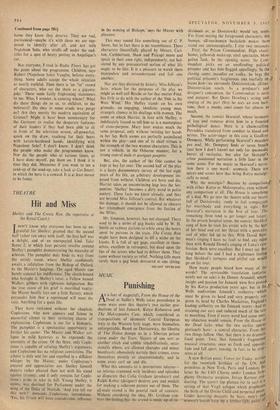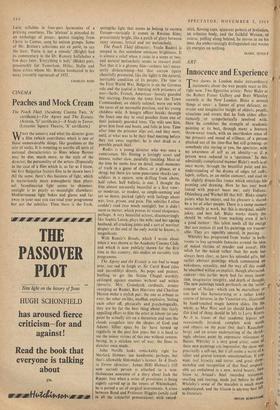MUSIC
Punishing
As a feat of stagecraft, From the House of the
Dead at Sadler's Wells takes precedence in some ways over this theatre's two earlier pro- ductions of late Janacek, Katya Kabanova and The Makropoulos Case, which, considered as transpositions of idiomatic Central European texts to the Western lyric stage, were themselves unforgettable. Based on Dostoievsky, the libretto of The House dumps us in a Siberian prison camp under the Tsars. Slayers of one Sort or another stitch and cobble rehabilitatively, occa- sionally whore, are allowed charades and minor beanfeasts, obsessively narrate their crimes, cross themselves piously or absentmindedly, and in some cases curl up and die.
What this amounts to is intermittent inferno— an inferno crammed with incidents and episodes so disparate that Colin Graham (producer) and Ralph Koltai (designer) deserve awe and medals for making a coherent picture out of them. The all-male crowd is the general ruck of convicts. Without overdoing the idea, Mr. Graham con- veys the feeling' that the crowd is made up of in- dividuals or, as Dostoievsky would say, souls. Far from muting the foreground characters, this human, all-too-human backcloth makes them stand out stereoscopically. I cite two instances. First, the Prison Commandant. High cheek- bones, yellowish make-up, steel spectacles, Mon-
golian look. In the opening scene, the Com- mandant picks on an unoffending political prisoner and has him flogged appallingly. In the closing scene, maudlin on vodka, he begs the political prisoner's forgiveness and tearfully re- 0
leases him—an extremely Dostoievskian, all-too- Dostoievskian touch. As a producer's and designer's conception, the Commandant is eerie and pungent. But Denis Dowling's acting and singing of the part (first he uses an iron bari- tone, then a mushy one) count for almost as much.
Second, the convict Skuratof, whose torments of loss and remorse drive him to a frenzied pathological dance. Here is a chain-rattling Petrushka translated from sawdust to blood and nerves. The actor-singer in this case is Geoffrey Dempsey. While performing Skuratof's macabre pas seal, Mr. Dempsey finds or saves breath (just how I don't know) not only for spasmodic bursts of recitative, but also for Skuratof's ► crime passionnel narration a little later in the same scene. For the music to Skurators narra-
tion there' is one word: aromatic. There are spices and scents here that bring Katya nostalgi- cally to mind.
Why the nostalgia? Because by comparison( with either Kaiya or Makropottlos, even without any comparison at all, The House is something of a dud. We go into the theatre with our hearts full of Dostoievsky, ready to feel compassion for everybody and everything in sight. But Skuratof's narration is the first of four:The remaining three tend to get longer and longer. In the prison hospital scene, the convict Shishka sang of how he took his errant wife by the hair of her head and cut her throat with a penknife. andof what led up to this. With David BO' man's singing I have no fault to find, any more than with Ronald Dowd's singing of Luka's con- fession. Both were excellent. But I must say that long before the end I had a nightmare feeling that Shishkors tortuous and pitiful tale would go on for ever.
How many people heard how many of the words? The serviceable translation (unfortfi- nately not on sale) is by Dennis Arundel!, whose insight and passion for Janacek were first proved by his Katya production years ago; but in the r
Wells auditorium Janacek's orchestra—which must be given its head and very properly was given its head by Charles Mackerras, England's leading authority on the Janacek scores—had us straining our ears and reduced much of the te:d to mouthing. Even if every word had come over- my objection would remain. From the House of the Dead lacks what the two earlier operas
gloriously have: a central character. From this two things follow. One, that there is no dramatis', focal point. Two, that Janacek's fragmented musical structures, once so fresh and appositei fade and fall apart, ceasing, in fact, to be slaw- tures at all.
A new Britten piece, Voices for Today, written for the twentieth birthday of the UN, had premieres in New York, Paris and London. tit' latter by the LSO Chorus under London So" phony Orchestra auspices, Istvan Kertesz con- ducting. The score's top plateau (so to say) is a setting of that Virgil eclogue which prophesies the birth of the Divine Child and perpetual peace; Under hovering descants by boys. men's 301-1.,, women's voices keep up a feather-light patter 0'
Latin syllables in four-part harmonies of a pricking sweetness. The 'plateau' is preceded by an anthology of peace: quotes ranging from Christ to Camus, ,sung by unison groups. Some of Mr. Britten's selections are ex parte, to say the least. 'Force is not a remedy' (Bright) had its commentary in the Dr. Ramsey hullabaloo a few days later., 'Everything is holy' (Blake) goes, presumably for Tamerlane, Hitler, Stalin and those critics whom Mr. Britten lambasted in his essay (recently reprinted) of 1952.
CHARLES REID







































 Previous page
Previous page